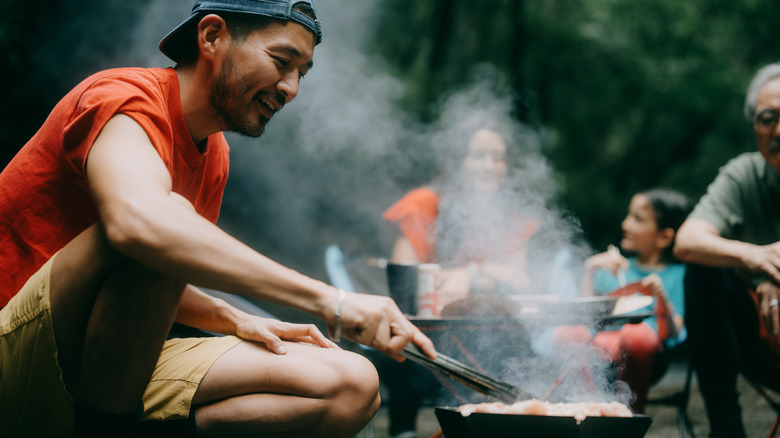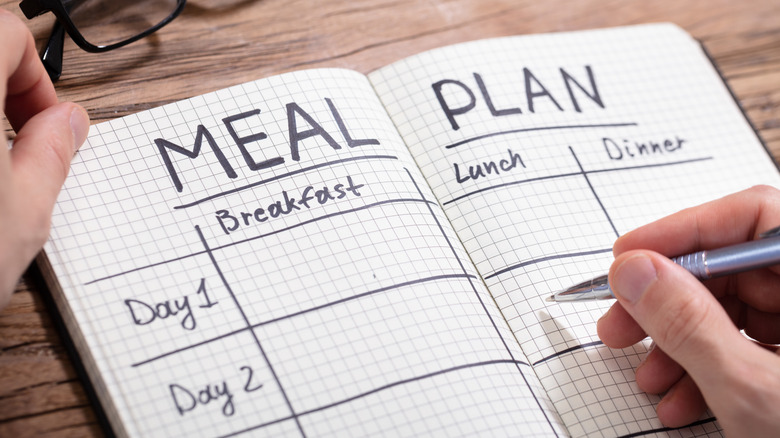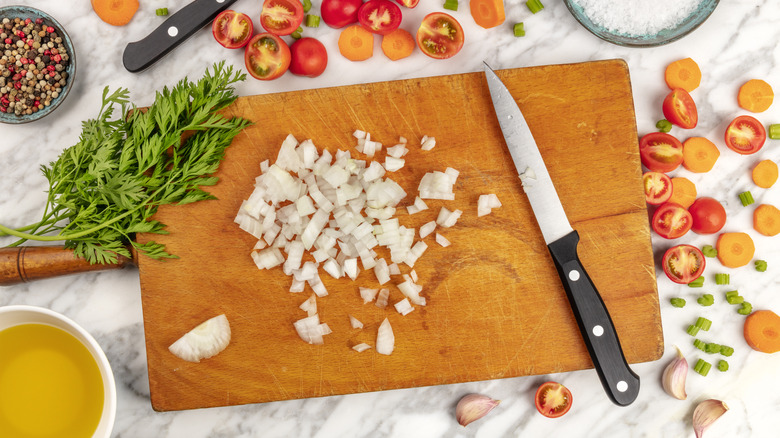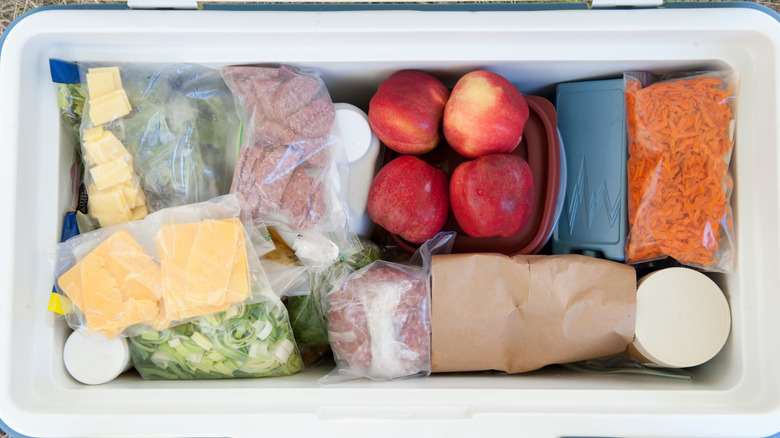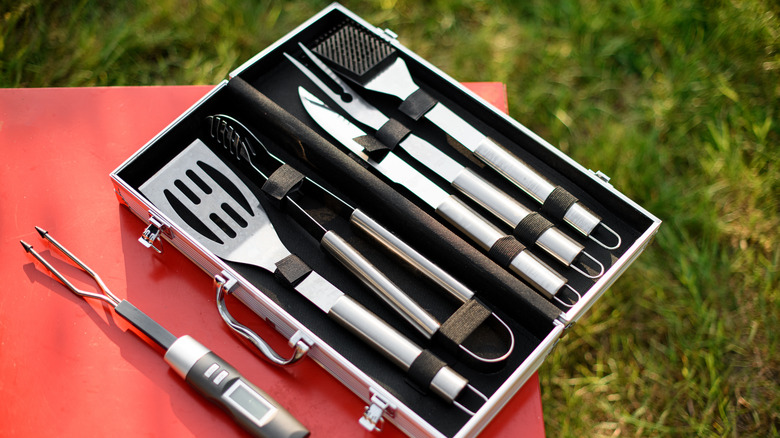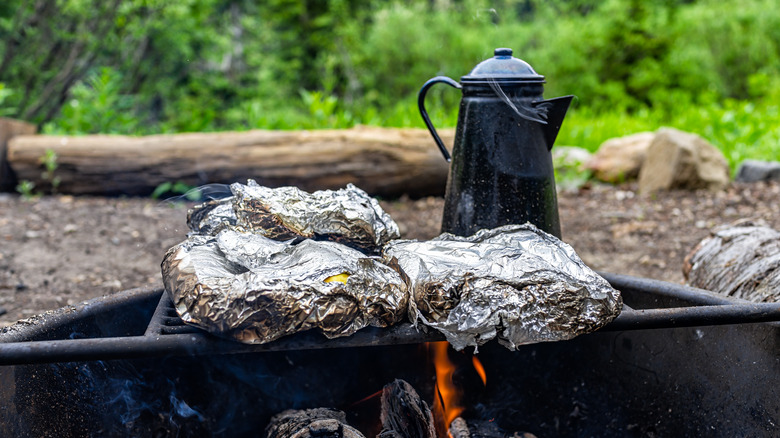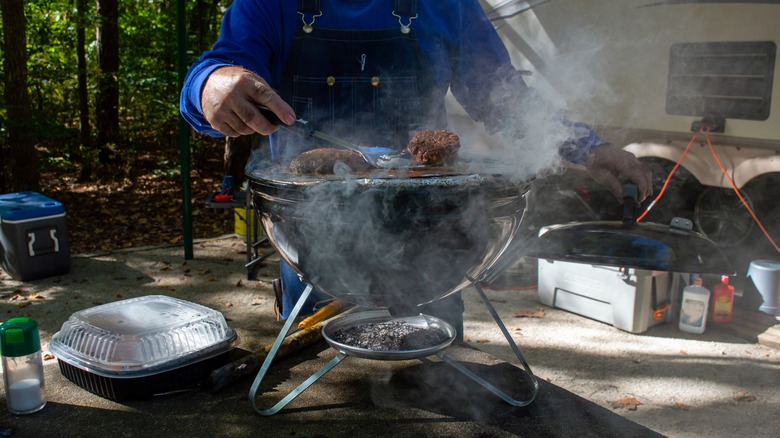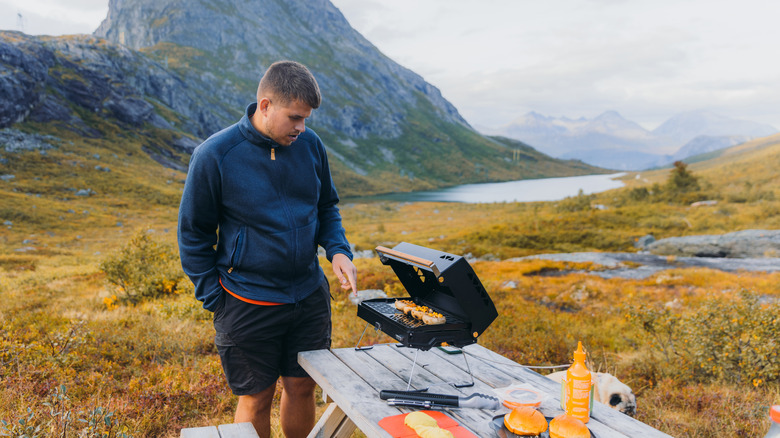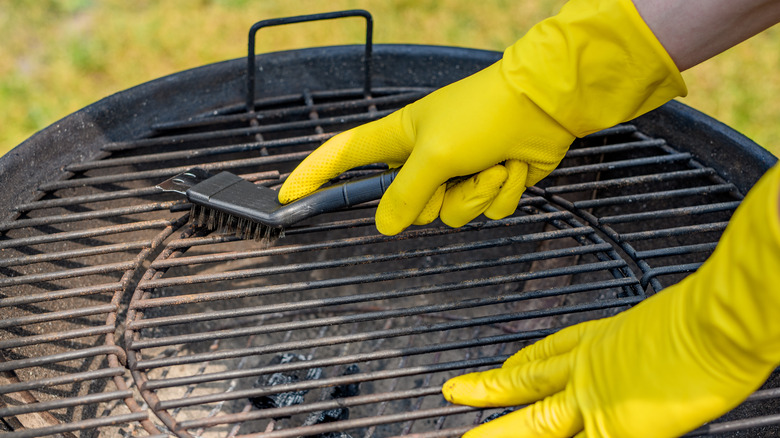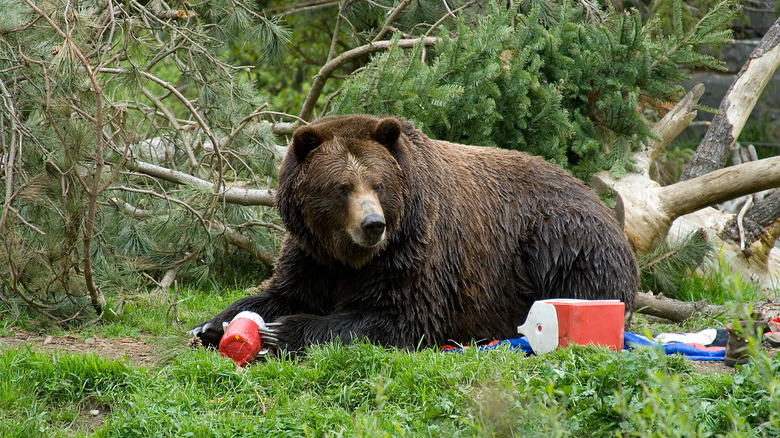Make Grilling At Camp An Absolute Breeze With These Helpful Tips
Firing up the grill is one of the best things about camping. There is something awesome about grilling in the great outdoors that just can't compare to the backyard. Even if you've got a portable propane cook stove or an RV kitchen, cooking at camp is special because, unless you're living a nomadic lifestyle, it is not something most of us do very often. In spite of this, however, grilling at camp is not without its stresses.
For all the fantastic meals you can make on the grill at camp, the prep, storage, travel, and cooking of said meals can be quite an involved process. This is why preparation is so important when getting ready for a camping adventure. If you treat grilling with the same care as packing essential emergency camping equipment, the entire process is going to be much easier.
The key to good camp grilling is to do as much prep work at home as possible. After that, it's a matter of collecting equipment, understanding your fuel, and making sure to adhere to proper grilling safety. By following these 10 tips, your next time grilling at camp will be an absolute breeze.
Plan your meals In advance
Meal planning is an essential part of camping life. Knowing what you are going to make and when takes so much stress out of cooking. Instead of trying to invent a meal on the fly, you already know and have all the ingredients set for what you're going to make. It may sound a little square, but meal planning is going to remove so much stress from the camp cooking process.
Depending on what you're thinking of cooking, your meal planning can occur weeks, or even months ahead of time. Obviously things can change, but having a general plan means that you know what you're going to be getting at the grocery store without having to compose an impromptu ingredients list. While certain meals, like hot dogs or burgers, don't require much forethought, planning pre-made meals well ahead of time will make the goings much smoother. It's important to look up local fire restrictions too, as that will affect what you can and cannot cook.
You'll be so glad to have a plan once you're out at camp. Instead of rifling through an unorganized cooler and trying to improvise a meal, you'll have everything ready and know exactly what you're going to make on what night. Preparation is the key to stress-free camp grilling.
Mise en place at home
While getting your meal plan solidified is a key component to camp grilling success, actually preparing those meals is another beast entirely. Again, depending on the meal, this could be done up to months in advance. There are several awesome meals you can prepare entirely at home and bring along to camp. The beauty of these meals is that you don't have to worry about making anything from scratch. All you have to do is warm them up, and you're ready to go. Sometimes you don't even have to do that.
Still, there are some meals that are best cooked fresh. Think fish, baked potatoes, kebabs, steak, and etc. Here's the thing, however. While the actual cooking is done at camp, you can still do all of the prep at home. In culinary terms, you mise en place in the comfort of your own kitchen. Get all of your ingredients measured, cut, sorted, and stored before leaving for camp.
Having these ingredients prepared saves a lot of time and trouble at the campsite. You don't have to worry about them while trying to do other things. Instead, you can just have your ingredients out and ready to use when you need them. This forethought can mean all the difference between a stressful meal, and a relaxing one.
The cooler is your friend
Unless you've got a portable fridge and a campsite with electrical hookups, all of your food is going to have to live inside of a cooler. An essential part of the camping arsenal, a cooler provides excellent storage space, and prevents your food from spoiling. A good cooler can be relied upon camping trip after camping trip. That is, of course, provided you've taken the proper steps to store your food properly.
All that meal prep you did ahead of time plays into this. Food that's cut, prepared, and stored in air tight containers or bags is going to take up far less space in the cooler, allowing for more storage. It's also a good idea to get the cooler nice and cold before packing any food. After that, basic cooler packing begins with a layer of ice at the bottom, pack those items that require the most cooling to stay fresh (meat, dairy, eggs), and continue to layer ice and food until the cooler is full. Save a separate cooler for drinks, as they take up more space and the constant opening and closing releases more of that essential cool air.
If you've packed your cooler properly, it is going to be your best friend. Improperly packed coolers can easily lead to mold growth, salmonella, and other harmful food borne bacteria. So, while it is an indispensable tool for camping, you need to do things right in order for it to work in your favor.
Pack the proper tools
One of the best things you can do to ensure camp grilling success is to pack the proper tools. You could have done all the meal prep in the world, but if you forgot to bring the grilling tongs and the spatula, what good was it? Having the right instruments is essential, otherwise you are going to find yourself floundering.
So, what constitutes proper grilling tools? Think of the essentials like spatulas, knives, tongs, mixing bowls, fire starters, measuring cups, knives, forks, spoons, and etc. Anything you would use when grilling at home should come with you to camp. Serving trays, baking sheets, and other means of transporting food from the grill to the plate is also good to have.
Take a look around your kitchen. Whatever tools make it run efficiently are also going to help your grilling efforts at camp. It may also be a good idea to purchase tools specifically for camping, that way you won't have to worry about sourcing from your kitchen. Instead, you'll have a set of tools already packed and ready to go on your next adventure.
Don't forget kitchen essentials
Along similar lines of making sure you have the right cooking tools, it is also beneficial to make sure you stock up on other, smaller kitchen essentials. There is a decent amount of flexibility when it comes to packing these, because everyone's kitchen is different. However, there are several that should make it onto everyone's grilling packing list.
Things like salt and pepper, your favorite spices or seasonings, cooking oils, butter, trash bags, matches, silverware, salad dressing, coffee creamer, and sugar are good examples. Again, recognize what you might use in your kitchen on a daily basis. General rule: if you can't go one meal without it, you're going to want to bring it.
However, there is perhaps no better kitchen essential to bring with you than aluminum foil. Its insulating and heat-resistant properties make it the perfect item for working around the flames of a hot grill. Keep your dinner warm, cook food, or use it to clean your grill. It's the ultimate camp cooking tool.
Know thy fuel
Now that you've gotten your food prepared for grilling, it is time to get your fuel in order. The type of fuel you're working with depends entirely on the type of grill you have or the type of grill that is available at the campsite. As such, there are three main fuel types to consider for camp grilling: propane, charcoal, and wood.
Propane can really only be used if you have a portable camping grill/stove. They typically come in prepackaged canisters, so you'll need to make sure you have ones that are full before you leave. Also, be sure that the canisters and grill are working by doing a test lighting before you pack anything.
Wood and charcoal can be used almost in tandem. If you have a portable charcoal grill or the campsite comes with a standing grill, make sure you have enough bags with you to last the length of your stay. The same thing goes with firewood, which is better suited to pit cooking and working with cast iron cookware. You can use charcoal in the fire pit, as well, if there's no standing grill available.
Grill safe at camp
Now that you've actually got your fuel lit and your grill going, you need to adhere to fire safety protocols. Grilling, perhaps more so than cooking, has the potential to be dangerous because you are playing with live flames and the outdoor elements. While rain can be a detriment to grilling, excessive heat and wind can easily cause hot ash and sparks to fly into brush and catch fire. Hence why you should always maintain a safe distance from the woodside while grilling.
There are national and local safety rules that need to be followed, as well as those of the campground. The National Fire Protection Association recommends checking all propane tanks for leaks, grilling away from low-hanging branches, never spraying the charcoal fire with extra fuel, and making sure your grill is attended to at all times. It's also important to keep kids and pets at a safe distance from any heat source.
For the grillers themselves, heat resistant gloves, long-handled utensils, and a fire extinguisher are all important tools to have. The former keeps your appendages safe from burns, while the latter aids in suppressing any fire that springs up. Overall, if you follow these rules, you'll have no trouble maintaining your safety.
Clean your cooking area
Another important component of camp grilling safety is to make sure that your grill is cleaned before using it. Whether it is your own grill or the one provided by the campsite, getting it clean is going to make a world of difference. Grease build up can easily catch fire, which can cause both your meal, and potentially your campsite, to be ruined. Grease fires, however, can be easily suppressed by covering the flames with a metal lid or hosing down with a fire extinguisher.
A clean grill is also essential to help prevent the spread of harmful bacteria. The more grease and food build up there is, the more likely it is going to be that bacteria are going to be attracted to it. Those bacteria will likely transfer to your cooking food if the heat is not strong enough to kill them off. Grease flare ups also have the potential to burn your food and leave an undesirable aftertaste. Leftover food bits are also a great attractor of wildlife.
To clean your grill, it's actually best to bring it up to screaming high heat in order to loosen the stuck particles and kill off any bacteria. Then, using a wire brush or a knob of aluminum foil, brush the grill grates until they are clean. Do this after every meal, and you should have no problems.
Utilize a wide variety of cookware
When it comes to camping cookware, there are plenty of options to choose from. Therefore, having a few essential pieces that you can return to again and again is more effective than trying to bring your whole kitchen arsenal. The best camping cookware can travel well and make a wide variety of dishes.
This is why dutch ovens and cast iron skillets are the most versatile camping cookware. They can be used in your home kitchen, and also out on the campground. They can withstand tremendous heat, and can be used to cook practically everything from morning fried eggs to evening mac and cheese. The one downside to both is that because they are made of cast iron, they have a tendency to be extremely heavy. However, if you're only bringing one of each, that shouldn't be too bulky.
Still, if you're looking for something more portable and lightweight, there are a wide variety of stainless steel pots and pans specifically designed for camp grilling or cooking. Whichever you choose, having them on hand allows for more versatility and ability to cook.
Store your food properly
As mentioned earlier with the cooler, proper food storage can mean the difference between food that keeps and food that spoils. However, there is more to keeping food stored than making sure it keeps well. Whenever you bring food to a campsite, you run the risk of attracting appetites larger than your own. If you don't keep your food properly stored, wildlife is going to be instantly attracted to your site. While there are many coolers that are tested to repel bears (and many campgrounds come with special safes to keep them away), the fact is that you don't want to be attracting something as large and dangerous as a bear to the campground.
To keep your food as fresh as possible, utilize airtight containers that are easily packable and able to keep the elements out of your food. Bottles are excellent for storing things like soups, salad dressings, and other more viscous meals. Keeping your meals from spoiling or being gotten at by animals is also a great way to ensure that all your hard work doesn't go to waste.
Following any one of these tips is going to help make sure your grilling at camp is going to run smoothly. Preparation is the biggest thing to take away from this, but also ensuring that you're doing things safely and keeping your food fresh as possible. By following the above steps, grilling at camp is going to be an absolute breeze.
